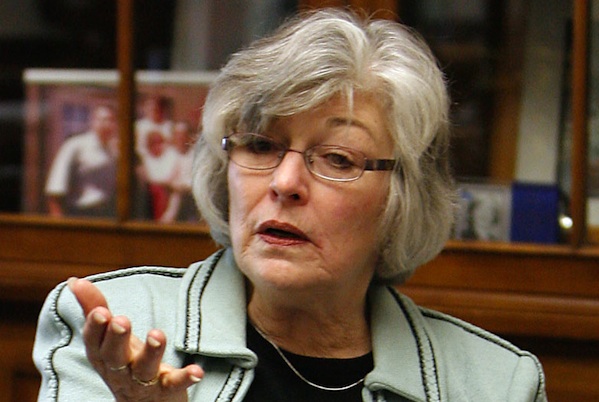Facing Steep Odds, 128 House Democrats Revive the Public Option
“As the deficit continues to grow, so does the need for a program that can save billions of dollars, says Rep. Lynn Woolsey.
Author:Alex MercerReviewer:Nathanial BlackwoodJul 31, 20207.3K Shares131.3K Views
Rep. Lynn Woolsey (D-Calif.) is leading the charge for a new public option health plan. (Santa Rosa Press Democrat/ZUMApress.com)
Four months after President Barack Obama enacted the Affordable Care And Patient Protection Act, House Democratshave revived a top liberal prioritythat was eliminated from the sweeping health care law in the latter stages of a grueling year-long debate: the public option.
[Congress1] Armed with a new line of attack aimed at soothing deficit fears, Democratic Reps. Lynn Woolsey (Calif.), Jan Schakowsky (Ill.) and Pete Stark (Calif.) last Thursday unveiled a billthat would offer consumers the choice of a “robust” government-run insurance plan alongside the private plans in the law’s exchanges. TheCongressional Budget Office projectsthat the bill, which has gained 128 co-sponsors, will reduce the federal deficit by $68 billion between 2014 and 2020.
“As the deficit continues to grow, so does the need for a program that can save billions of dollars and improve health care while doing it,” Woolsey, the co-chair of the progressive caucus, told The Washington Independent. “We are introducing the public option now so it will be available as a ready-made offset or deficit reducer in this or the next Congress.”
Schakowsky argues that the lower overhead costs of government plans such as Medicare would allow the public option to create a better deal for consumers. “We could offer that kind of plan at a lower cost, and it would compete with private insurance companies, who would have to be more efficient and lower their costs,” she told TWI. “It would follow the same rules as private insurers.”
The measure is unlikely to reach the floor this year, and could face even steeper odds next Congress. If nothing else, it appears part of a concerted effort by Democrats to galvanize disenchanted progressives and attack Republicans ahead of the tough November midterm elections.
“You’re the deficit hawks,” saidRep. Raul Grijalva (D-Ariz.), referring primarily to Republicans, “and we’re giving you a tool to be able to deal with the deficit.” Grijalva labeled deficit-minded lawmakers who refuse to consider the public option “hypocrites,” alleging that “the excuse that it was going to be too expensive is phony.”
For Democrats in election mode, catering to liberal wishes could help bridge thewide enthusiasm gapamong voters — a key predictor of midterm victories, where the main objective is to turn out the party base. AReuters/Ipsos polllast month found that 72 percent of Republicans were “certain” they would vote in November, compared to only 49 percent of Democrats.
“I do think this turnout issue is really going to be the crucial indicator, and the election hangs in the balance on how many of those less-committed Democrats actually turn out again,”saidIpsos pollster Julia Clark.
“That is a very real issue that we’re focused on,” Rep. Chris Van Hollen (Md.), the head of the Democratic Congressional Campaign Committee, admitted to Reuters. Apart from the public option bill, the White House on Mondaystrongly hintedit will choose liberal favorite Elizabeth Warren to lead the consumer protection agency. On Tuesday, Senate Democrats forced a cloturevote on the DISCLOSE Act, also a progressive priority, despite widespread expectations that itwouldn’t pass.
Republicans, who have depicted the public plan as a slippery slope to a national single payer system, derided the attempt to revive it and dismissed the CBO report. “House Democrats still don’t get it,” National Republican Campaign Committee spokesman Paul Lindsay told TWI. “As if it wasn’t enough to vote for their party’s overreaching health care takeover that was soundly rejected by Americans, they now have the audacity to propose a government option which would put health care in the hands of bureaucrats and further bankrupt our nation.”
The CBO estimates that the public plan’s premiums would be, on average, 5 to 7 percent lower than the private plans in the exchanges. Providers would be paid Medicare rates plus 5 percent, a figure that would rise alongside physicians’ costs.
“Although skepticism about big government is growing, the CBO estimate gives [Democrats] an important selling point at a time of rising concern about deficits,” said Jack Pitney, a political scientist at Claremont McKenna College.
Popular among the populace but highly controversial in Congress, the public plan has the political disadvantage of facing fierce opposition from insurance companies, which fear competition from the government. And progressives shouldn’t hold their breath for a vote. “It’s unlikely it’ll be taken up this session,” a House Democratic aide conceded, saying only that it’s “quite possible” next Congress. But is it?
“For the progressives, it’s now or never,” Pitney argues. “They know that Republicans will make big gains in 2010, probably winning the House and maybe even the Senate. The numbers favor further GOP Senate gains in 2012.”
Despite the historic accomplishment, liberals cannot help but look back on the vexing health care debate with wistfulness, if not bitterness. Even though the bill covers 30 million Americans, liberals felt short-changed by its lack of a public insurance program. While the House passed a version of a public option in its November legislation, it was removed from the Senate version due to a lack of votes, and subsequently pronounced dead. (For a few liberal activists, this was the final straw that made the legislation no longer worth passing.) One day later, a CBS poll foundthat six in ten Americans favored the opportunity to choose between private insurance plans and a government plan. Surveys have consistently foundthat a large majorityof the American public support the idea.
At the time, President Obama, soothing concerns of House progressives unsure whether to back a bill without it, reportedly assured them in privatethat it was merely a first step and he’d be willing to return to the public option later.
But major domestic initiatives are more likely to occur early in presidential terms, Pitney noted, arguing that the measure’s chances of success during this Congress are slim – but not nil. “It’s a Hail Mary pass, to be sure,” Pitney said. “But Hail Mary passes sometimes work. And Speaker Pelosi likes the Hail Mary. And if they fail to make the effort now, they will regret it in the future. Better a Hail Mary in 2010 than an Act of Contrition in 2011.”

Alex Mercer
Author
Alex Mercer is a seasoned author and analyst specializing in wealth research, with a keen focus on evaluating the net worth of individuals across various industries. With over a decade of experience in financial analysis and wealth assessment, Alex has developed a nuanced understanding of the factors that contribute to an individual's financial status, from investments and assets to market trends and economic policies. His work involves in-depth reviews and analyses, providing insightful observations on wealth accumulation, management strategies, and the socio-economic implications of wealth distribution.
Throughout his career, Alex has become known for his ability to distill complex financial data into understandable and engaging narratives, making the subject of wealth and net worth accessible to a broad audience. His expertise is not just in numbers but in telling the stories behind them, highlighting the journeys, strategies, and decisions that lead to financial success or challenges. Alex's contributions to the field of wealth research are valuable resources for anyone looking to understand the dynamics of wealth in today's world, offering a unique perspective that bridges the gap between financial analysis and human interest.

Nathanial Blackwood
Reviewer
Nathanial (Nate) Blackwood is a distinguished financial journalist with a decade of experience in net worth analysis. He holds an Economics degree from the University of Finance and a Data Analysis certification, enabling him to blend thorough insights with engaging storytelling. Nate is known for making complex financial information accessible to a wide audience, earning acclaim for his precise and reader-friendly analyses. Beyond his writing, Nate is dedicated to financial literacy, actively participating in educational forums and workshops.
He is the founder of PureNetWealth, a platform that demystifies the financial achievements of public figures by exploring the strategies and decisions behind their fortunes. Nate's work bridges the gap between intricate economic concepts and the general public, inspiring a deeper understanding of wealth dynamics. Follow Nathanial Blackwood for essential insights into the financial narratives shaping our world.
Latest Articles
Popular Articles
